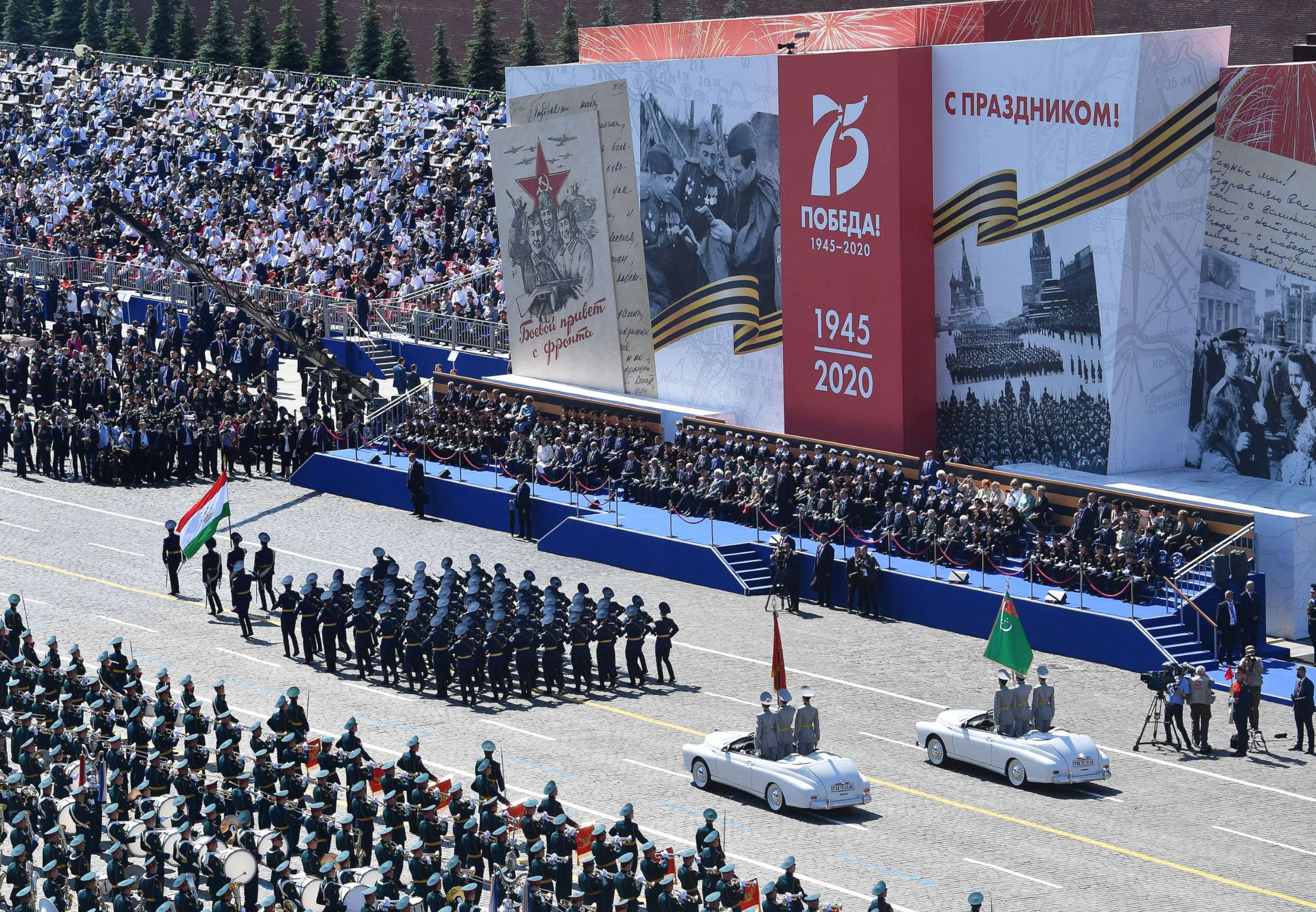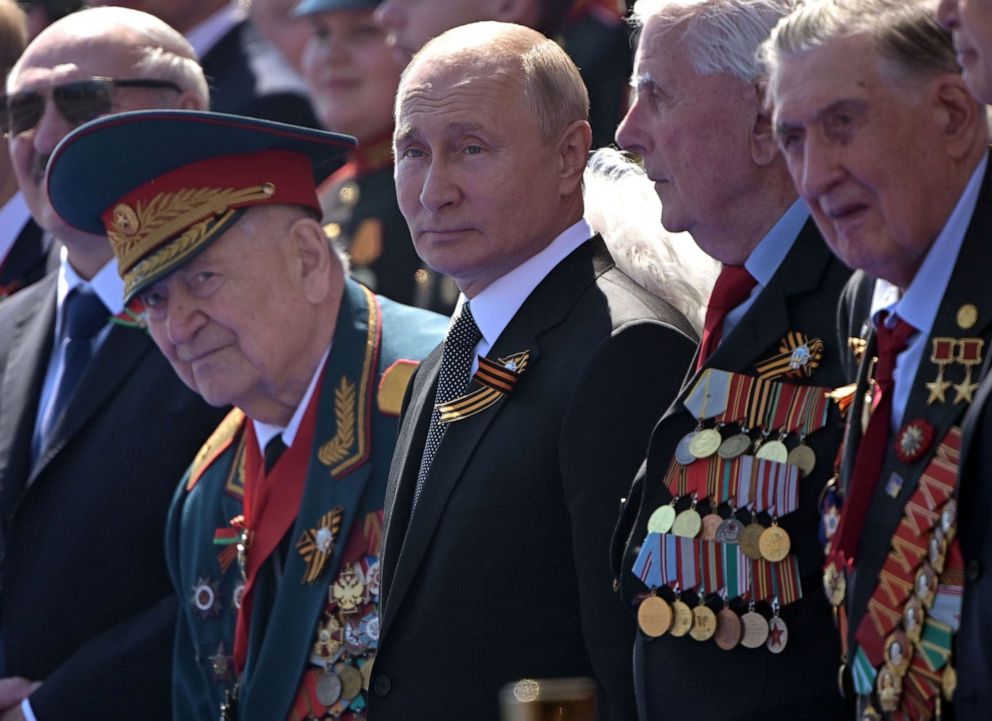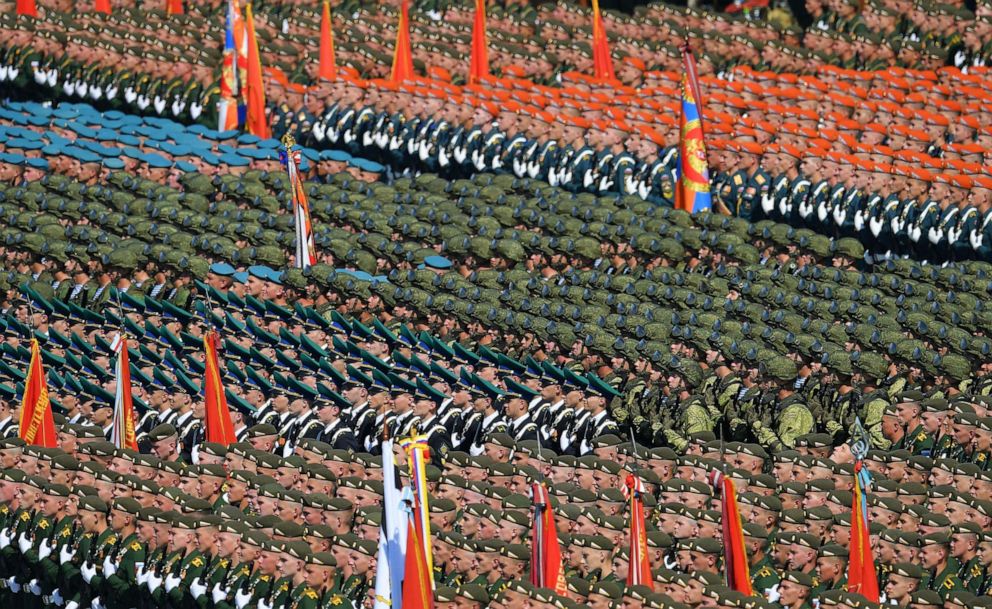Russia holds military parades despite continuing coronavirus epidemic
Thousands of troops march in Victory Day parades that were postponed in April.
Russia on Wednesday staged grandiose military parades involving tens of thousands of troops to mark the end of World War II despite a coronavirus epidemic that is continuing to grow in many parts of the country.
The annual Victory Day parades marking the Soviet defeat of Nazi Germany are normally held on May 9 and have become a key fixture of President Vladimir Putin’s rule. But this year the Kremlin was forced to reluctantly postpone the commemorations as Russia sat in lockdown.
The Kremlin, however, has been determined to put on the parades, which it views at important to Putin’s popularity, and has pushed forward to have them coincide with a referendum this week to change Russia’s constitution that will allow him to remain in power beyond his presidential term limits.
It had been thought the parades might be postponed until autumn, but with signs that Moscow is emerging from the worst of its epidemic, Putin has swiftly gone ahead with them, even though the capital is still recording around 1,000 cases a day and many regions are still at high risk for infection.
Parades took place on Wednesday in over two dozen cities. The centerpiece as usual was in Moscow, presided over by Putin, who watched around 14,000 troops march together across Red Square, followed by hundreds of armored vehicles and missile carriers. A crowd of military veterans on the square watched from a bandstand, several donning face masks.

Addressing the troops, Putin said there was a “duty” to commemorate the Soviet people’s defeat of Nazism.
“We will do everything that’s needed from us so that the memory of your heroic achievements will never dim,” Putin said.
The Kremlin had planned for this year’s commemorations for the 75th anniversary to be especially large. World leaders, including France’s Emmanuel Macron, had planned to attend in May, but few came for the re-scheduled parade.
Putin did not mention the coronavirus in his speech, but the commemorations have coincided with authorities declaring that Russia has overcome the worst of the epidemic.
In a televised address a day earlier, Putin said Russia had forced “the virus to retreat” although he acknowledged the situation remained “complicated” in three regions.

In reality though, while Moscow has passed the peak of its epidemic several weeks ago and has seen a fall in cases, in many regions the epidemic is only now starting to reach its worst.
Russia continues to record around 7,000 new cases a day and on Wednesday the country’s total infections since March passed 600,000. Russia has the third largest epidemic in the world, behind only the United States and Brazil.
Health workers and opposition figures in that context have criticized the parades and the upcoming referendum vote as needlessly dangerous.
The new date for the rescheduled parades was chosen to coincide with the first victory parade that took place in Moscow in 1945. But they also effectively kick off the referendum that begins on Thursday. The vote was also postponed by the pandemic in April and will now take place until July 1 to allow for greater social distancing.
Alongside a number of amendments, Russians will be asked to vote on whether they agree to allow Putin to "reset" the count on his presidential terms from four to zero, allowing him to run again for office in 2024.
Some health workers have warned the parade and vote risk a fresh surge of infections for hospitals that have been working at their limits for months or are right now being overwhelmed with patients.
“Vote whoever wants to, but there’s no more beds in the city,” Viktoria Adonyeva, the chief infectious disease specialist for Oryol region, about 250 miles south of Moscow, told a local site last week.

Precautions were taken ahead of the parade -- the troops were kept in quarantine in the weeks before it. The around 80 veterans sitting behind Putin were also kept isolated in a resort outside Moscow for two weeks.
But thousands of people still thronged in central Moscow to watch the troops, even though mass gatherings are still prohibited.
Russia's government authorized regions to begin relaxing lockdown in early May, and the country is in different states of restriction. In Moscow, restrictions were abruptly lifted shortly after Putin announced a date for the referendum, a sudden reversal by the city's authorities who had said the measures would be needed for several weeks more.
But while Moscow’s epidemic has eased, the virus arrived far later in many regions and official statistics show their curves of infections are still growing steeply and have not reached their peak.
The provinces are far less well-equipped and many have lacked basic protective gear. Irina Sukhanova in late May was hospitalized with COVID-19 in the closed northern city of Severodvinsk. She told ABC News there had been only two nurses and one doctor on her ward to care for 57 coronavirus patients. In several other regions, ambulance crews have reported having to drive from one hospital to another looking for a bed for patients.
Anastasia Vasilyeva, who heads a health workers union and is a fierce critic of Putin, said it was “really absurd” to hold a parade and a national vote during an epidemic.
“I am a doctor, I really understand how difficult it will be when a lot of patients in the regions fill and fill the hospitals,” she said, calling it a “betrayal” of health workers.
Independent demographers in Moscow have also warned there are clear signs the virus statistics provided by authorities in many regions are artificially low. The data from dozens of regions shows anomalously smooth growth rates that are mathematically highly unlikely.
Russia’s official death toll also remains exceptionally low given the size of its epidemic, at just 8,513. This month, the Moscow city government acknowledged the real toll for the city in May was 2,000 more than it had previously said. The data suggested that official count released from Russia’s national coronavirus response center is likely undercounting thousands of deaths.
Demographers, however, have said the total mortality data still suggests Russia has not suffered as badly as some countries for now. Moscow in May registered around 5,000 more deaths than usual. Though still large, it is substantially fewer than some other major international cities, such as New York, which recorded roughly 35,000 more deaths than normal between March and May.




